
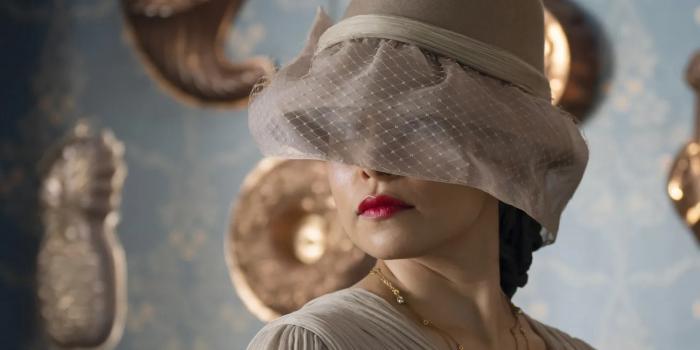
'Percy Jackson' and the Nature of Monsters
By Nate Parker | TV | January 9, 2024 |
By Nate Parker | TV | January 9, 2024 |

Here Be Spoilers
What makes a monster?
Four episodes in, Percy Jackson and the Olympians remains peak family entertainment. Percy, Annabeth, and Grover are on a cross-country trek bound for Los Angeles, where the gates to the Underworld can be found. That’s if the endless parade of monsters seeking to bring their quest to an abrupt halt don’t eat them first. But while the creatures remain the same, the stories that accompany their appearances are quite different from author Rick Riordan’s original manuscript, and that’s a good thing.
The Lightning Thief broke myths of Greek gods and monsters down to their most basic elements. It’s a fantastic YA read, but simplified for its audience, and in many ways a modern retelling of the original Perseus and Medusa myth. The quest items are the same. Percy’s sword Riptide, a gift to the first Perseus from Hephaestus, and then passed on to Jackson by Chiron; winged shoes, created by Hermes, passed to Percy from Luke; and Annabeth’s hat of invisibility, standing in for Hades’s helm. In The Lightning Thief, Medusa is a two-dimensional villain despite her tragic origin. Seduced by Poseidon in Athena’s temple, the goddess’s wrath fell on Medusa and her sisters, Euryale and Stheno, rather than her fellow deity. Medusa’s only motivation is the continued destruction of the gods’ children and servants for Athena’s betrayal.
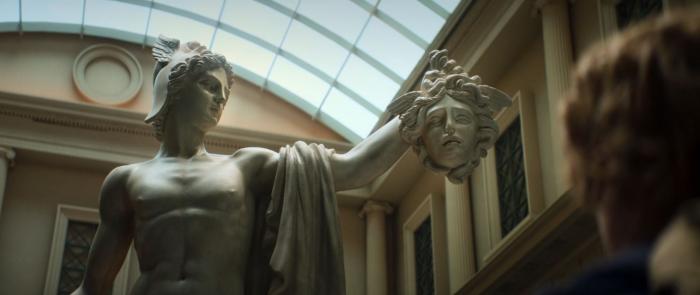
Percy Jackson and the Olympians takes a more nuanced approach. Sally Jackson (Virginia Kull) takes a young Percy (Azriel Dalman, who looks so much like Walker Scobell they really could be the same person at different ages) to view an exhibition of Grecian history and myth at the Metropolitan Museum of Art, particularly Perseus with the Head of Medusa by Antonio Canova. “What makes you think Perseus was a hero?” she asks her boy. “What makes you think she was a monster?” Later, she describes Percy’s father Poseidon in glowing terms. “Wise, brave, kind, and noble… I had never met a man like him before.”
Sally’s words are at first echoed by Medusa herself in the third episode, “We Visit the Garden Gnome Emporium.” A devotee to Athena, Medusa (Jessica Parker Kennedy) worshiped the goddess for years without response until Poseidon visited and seduced her. He, at least, made her feel seen and appreciated. Outraged by the betrayal, Athena punished Medusa by turning her and her sisters into the Gorgons, with snakes for hair and a petrifying gaze. Poseidon escaped unscathed, as the gods nearly always do for their transgressions. Medusa lashes out at others for her punishment, particularly demigods. It’s her method of seeking revenge by proxy that makes Medusa monstrous, rather than her sad origin. Even so, there’s a strong case to be made that Athena’s pride and actions make her as monstrous as Medusa, and lays the blame for her misdeeds at Athena’s feet.
Percy understands how Medusa feels. Abandoned by his immortal father for no good reason he can see, Percy is reluctant to give deadbeat deities the benefit of the doubt. The parallels between Medusa and Sally Jackson are too much for Percy to ignore. Poseidon abandoned the Gorgon just as Sally was left to fend for their son. After Percy defeats Medusa, he packages her head and ships it to Mount Olympus as a statement of what the demigods are capable of on their own, and criticism of the gods’ selfish and shortsighted actions. Annabeth and Grover aren’t thrilled with the idea, because they know it could anger the gods.
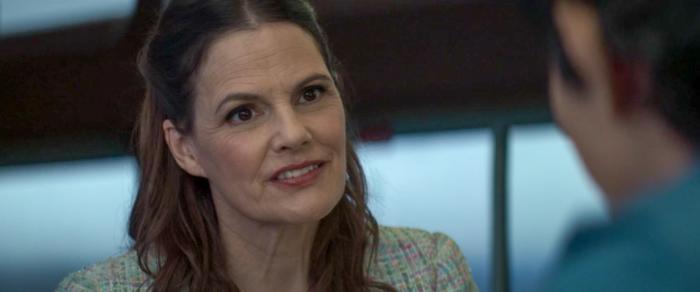
The debate continues in “I Plunge to My Death,” and Percy’s view that any relationship where one side demands tribute and fealty, but feels no obligation in return, is unfair. Annabeth points out many human relationships aren’t that different, and at least with the gods a person knows the rules. Advocating for capricious absentee parents is a tough sell at best, and Annabeth’s argument isn’t helped by the sudden appearance of Echidna, Mother of Monsters (Suzanne Cryer). Her children include the Sphinx, Cerberus, and the Hydra among many others, and Echidna sees herself as a gardener, pruning back the demigods who murder her children. Worse, the gods approve of this testing to destruction, as Annabeth learns when Athena, angered by Percy’s impertinence - a word that made my daughter cackle like a deranged monkey - allows the Chimera to hunt her daughter and friends through the Gateway Arch. It’s no mistake in the background is an exhibit on the collision between Manifest Destiny and the Native Americans, and the resulting tragedy. Grover’s grief at the mass slaughter of the buffalo and wild places destroyed by the white pioneers’ western advance adds yet another perspective, one many young viewers might not have seen yet in school. Beasts, gods, and humans; we’re all monsters to someone. Given the Whether Percy’s low opinion of the gods is shifted by Poseidon sending a nereid upstream with a message for his son remains to be seen.
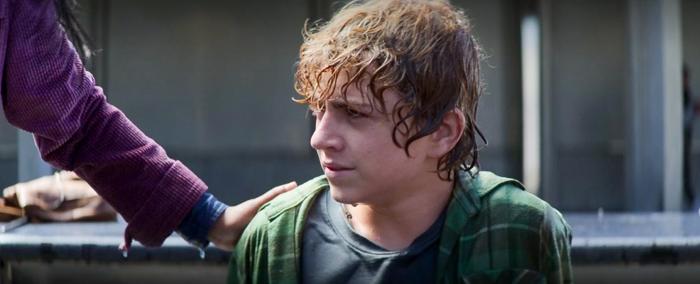
A fun final note: It didn’t take much to make Walker Scobell look near death while he was sitting in the fountain; they just removed the makeup they slather on to keep him from blowing out the camera exposures. He really is that pale! (h/t to my wife for the source!)
@charlottemobie Walker talking about being pale in episode 4 #percyjackson #percyjacksonandtheolympians #walkerscobell #walkerscobelledit #percyjacksonedit #percyjacksonfandom #pjo #percabeth ♬ original sound - spotify lyrics
← Reddit Asks the Question: 'Which Character Steals the Movie With One Line?' | Aaron Rodgers Addresses the Jimmy Kimmel Situation on 'The Pat McAfee Show' →
More Like This
Charming Ramy Youssef Mines the Comedy of NPR's Tiny Desk Concerts as Host of 'SNL'
Spoilers: Netflix’s Korean Comedy 'Chicken Nugget' Is Getting Review-Bombed Over A Single Joke
How 'The Regime' and 'Palm Royale' Complicate Their Genres
Jenna Lyons Has Conditions For ‘Real Housewives’ Return
This Week On ‘Selling Sunset’: Irreconcilable Differences
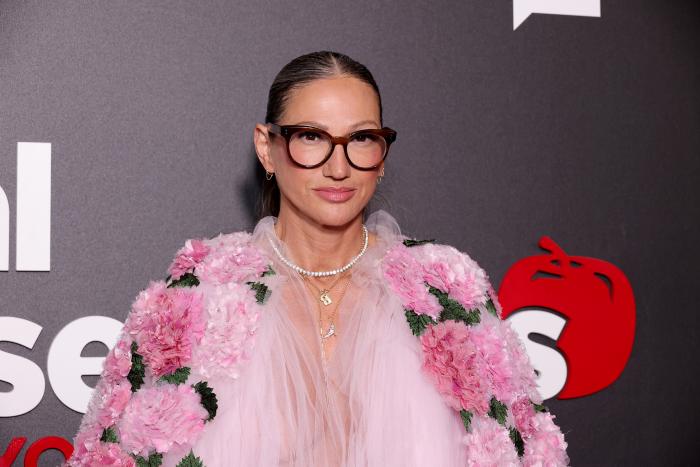
Jenna Lyons Has Conditions For ‘Real Housewives’ Return
This Week On ‘Selling Sunset’: Irreconcilable Differences
Huey Lewis Was Inspired By 'Mamma Mia' For His Next 'Career Event'
Paramount+ Is Getting Cues From David Zaslav
Yorgos Lanthimos Reteams with Emma and Viggo Goes West In Three Trailers
Kristen Stewart Will Never Make an ‘Algorithmic’ Marvel Movie
More Like This
Charming Ramy Youssef Mines the Comedy of NPR's Tiny Desk Concerts as Host of 'SNL'
Spoilers: Netflix’s Korean Comedy 'Chicken Nugget' Is Getting Review-Bombed Over A Single Joke
How 'The Regime' and 'Palm Royale' Complicate Their Genres
Jenna Lyons Has Conditions For ‘Real Housewives’ Return
This Week On ‘Selling Sunset’: Irreconcilable Differences
Reviews